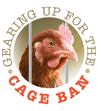Does the layer future lie in enriched cages?

It could be assumed that a recent EU Commission report, which confirmed that conventional cage systems for layers will be banned in 2012, would allow producers the chance to focus on meeting the new regulations.

Instead, the move has caused yet more disruption in the industry, with opinion divided over whether a derogation will be issued as the deadline draws nearer.
An EU-wide ban on conventional cages from 1 January 2012 will leave egg producers with two choices: They can either opt for non-cage systems or install enriched cages, which offer greater space, as well as nesting and scratching areas and perches.
Noble Foods’ Andrew Joret points out that there are around 400m hens in the EU 27, with some 80% currently in cage systems. Birds in fully enriched cages are in the minority, which means that more than three-quarters of the total EU laying flock will need to be re-housed within the next four years.
“This is clearly impossible,” says Mr Joret, who is also deputy chairman of the British Egg Industry Council. “I suspect that come 2011, half the EU flock will still be in systems about to be outlawed.”
Decision-makers
He cites several reasons for his conviction that decision-makers will announce a derogation.
Meanwhile, Noble Foods plans to continue its policy of spreading risk, by adopting a range of systems for the flocks under its management. These include standard cages, enriched cages, free range, barn and organic.
“There is too little time and too little money available for all producers to comply. Even if it only cost £10 per bird place to convert to enriched cages, it would add up to billions of pounds across the whole of the EU. Another issue is that we don’t have adequate cage manufacturing or installation capacity.”
Mr Joret predicts a similar outcome to events in Sweden, when the country’s politicians took an abrupt about-turn as their cage ban deadline loomed in 2000. By 1999, it was obvious that many Swedish flocks could not meet the requirements. Faced with the prospect of allowing the country to be flooded with imports from caged flocks abroad, ministers ordered vets to visit farms and issue time-limited exemptions where they found caged birds being managed to a high standard.
Marketplace
The marketplace will ultimately decide how eggs are produced in the future, concludes Mr Joret.
“The big question is where is the ‘value egg’ of the future going to come from? Welfare lobbyists are promoting barn and free-range systems, not enriched cages.”
In an official statement, the NFU has commented that a ban on battery cage egg production will be “worse than useless,” if the same standards are not applied to imports.
NFU chief poultry adviser Rob Newbery is disappointed about the Commission’s 18-month delay in publishing its report, but thinks it unlikely that a derogation will be issued. However the situation has left UK producers in a state of limbo, with many believing that the introductory date could be put off until as late as 2017.
Conversion by 2012?
“Some member states will struggle to meet the demands of the ruling. Countries like Spain have so many producers using cages, it’s difficult to see how they can all convert by 2012,” says Mr Newbery.
“In other member states, such as Bulgaria, producers may not be able to afford the conversion – their priority is to produce eggs as cheaply as possible.”
He expects that politicians will be reluctant to risk their credibility by prolonging cage use. Therefore, the NFU is recommending that its members prepare to install enriched cages. Future lobbying will focus on marketing strategies.
“We want DEFRA to guarantee a ban on imported eggs produced using standards that would be illegal in this country.
“At the very least, we need to come up with a marketing plan to make consumers aware of the differences between eggs from caged birds and eggs from birds in enriched cages. That might be achieved using an egg stamp. Either all member states should have sufficient time to convert, or marketing legislation should make competition fair,” says Mr Newbery.
